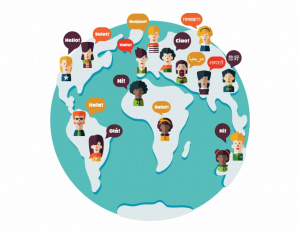Language/Multiple-languages/Grammar/Common-Mistakes
There are common mistakes made when learning languages. I have observed people mainly on HiNative, also with my own experience.
I think the words "learning a language is not hard" is misleading people. It makes people undervalue the complexity of language learning.
Wrong pronunciation[edit | edit source]
Words are being pronounced like in people's native languages.
Wrong pronunciation of a heteronym[edit | edit source]
People are making the wrong choice, and some even don't know such a thing.
Wrong meaning of a polysemic word[edit | edit source]
A word may have different meanings. That's very common. But people are taking a wrong one.
Wrong word from many parasynonyms[edit | edit source]
Some words have similar meanings, and people are mixing them up.
Wrong usage of a "cognate"[edit | edit source]
There are cognates in different languages. When people see a word which is so familiar, then they are assuming that their usages are all the same and using it as in the language they have learned. Some of them look similar, but they are actually not cognates. It is "false friends", which include both real and false cognates which have different meanings in different languages.
Wrong usage of a phrase[edit | edit source]
A phrase, usually a verb phrase, is mistaken. There can be many phrases derived from a verb, and relatively fewer in other parts of speech, and people are choosing the wrong one before knowing their correct meanings.
Wrong usage of an adposition[edit | edit source]
When it comes to adpositions, it becomes complicated. People don't understand how to use them correctly before hundreds of practice have been made. But before people know this, they just choose by intuition, with the help of their native languages.
Wrong usage of an abbreviation[edit | edit source]
This is usually forgotten. People don't know what an abbreviation exactly stand for and use it. In Mandarin Chinese channel I can see people saying "HSK test" over and over again, and common Chinese don't think it's wrong. In fact, "HSK" has included the word "test". I guess that this originates from their textbooks and teachers.
Wrong sentence order[edit | edit source]
Words are being arranged in the order of people's native languages. It's quite common.
Wrong punctuation[edit | edit source]
This is usually forgotten. There are two meanings of it: 1. Using punctuations in people's native languages for the languages being learned, in which the most notable is quotation marks in different languages and regions; 2. People even don't know how to use punctuations precisely, in both their native languages and the languages being learned, for example, using a comma as a period.
No logicality[edit | edit source]
People are saying something which is not logical, such as "I want to learn xxx(language), so you want to help me". There are several types of logical mistake that common people make almost every day. It is recommended to know them before laughing at others.
Totally deviated meaning[edit | edit source]
People may post a sentence for native people to check, and the native people confirm it. The sentence looks nice, but the one who posted it has comprehended it totally differently with native people.
This is uncommon, but it happened, happens and will happen.

